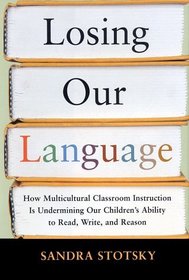Search -
LOSING OUR LANGUAGE : HOW MULTICULTURAL CLASSROOM INSTRUCTION IS UNDERMINING OUR CHILDREN'S ABILITY TO READ, WRITE, AND REASON
LOSING OUR LANGUAGE HOW MULTICULTURAL CLASSROOM INSTRUCTION IS UNDERMINING OUR CHILDREN'S ABILITY TO READ WRITE AND REASON
Author:
American students' reading and writing scores are steadily declining, and the increasing achievement gap between minority and other students is particularly alarming. The latest studies show that 43% of our children test below grade level. Educators, politicians, and parents all blame class size, crumbling schools, and inconsistent standards for... more »
Author:
American students' reading and writing scores are steadily declining, and the increasing achievement gap between minority and other students is particularly alarming. The latest studies show that 43% of our children test below grade level. Educators, politicians, and parents all blame class size, crumbling schools, and inconsistent standards for... more »
ISBN-13: 9780684849614
ISBN-10: 0684849615
Publication Date: 2/24/1999
Pages: 336
Rating: 3
ISBN-10: 0684849615
Publication Date: 2/24/1999
Pages: 336
Rating: 3
1 stars, based on 3 ratings
Genres:
- Reference >> Words, Language & Grammar >> Reading Skills
- Nonfiction >> Education >> General
- Nonfiction >> Education >> Education Theory >> Contemporary Methods >> Multicultural
- Nonfiction >> Education >> Education Theory >> Philosophy & Social Aspects
- Nonfiction >> Social Sciences >> Popular Culture





